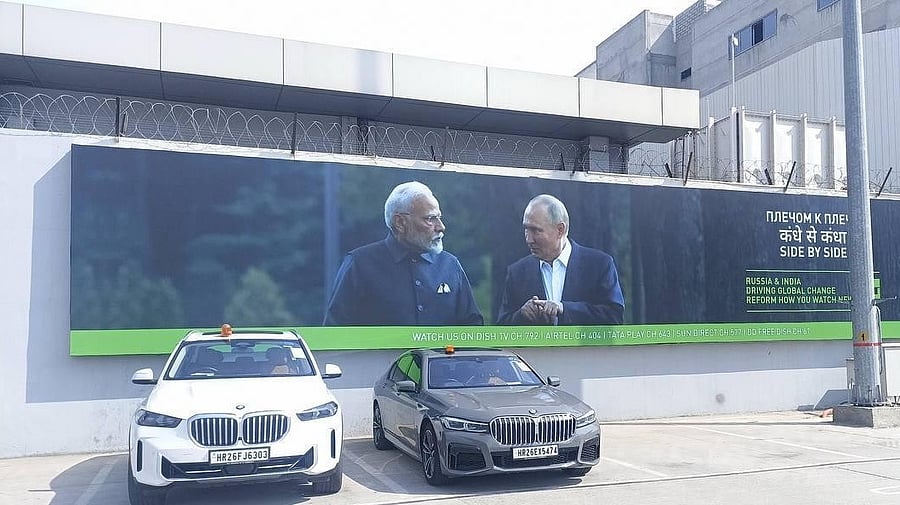
The focus will be on the Russia-Ukraine war as the Raisina Dialogue starts
Credit: Special Arrangement
After the US President Donald Trump’s White House spat with his Ukrainian counterpart Volodymyr Zelenskyy, foreign policy watchers could have anticipated another verbal duel in New Delhi this week. However, with the Russian foreign minister Sergei Lavrov pulling out of the 10th edition of the Raisina Dialogue on Monday, a fight-house face-off with Ukraine foreign minister Andrii Sybiha has been avoided, for now.
This year’s Dialogue, a three-day conference of global leaders, policymakers, and top businesses, unfolds in the shadow of the Trump administration’s aggressive push to bring warring sides in eastern Europe to the negotiating table. Prime Minister Narendra Modi, in an interview to an American podcaster on Sunday, said a solution would emerge if the two sides sit across the table and talk.
Russian President Vladimir Putin has already acknowledged the US role with “words of gratitude” towards President Trump and Modi for their efforts to work out a settlement. The huge billboard put up by the Russian state media RTV at the gate of the venue, featuring Modi and Putin, shows Russia’s new-found efforts in using the soft power of communication to build a favourable perception.
The theme for this year’s multilateral conference, with New Zealand PM Christopher Luxon as the chief guest, is Kaalchakra. But all eyes would be on the large US contingent led by US Director of National Intelligence Tulsi Gabbard along with 11 ministerial level representations from European Union countries. Gabbard’s renditions will be closely followed, especially by delegates from Russia and Ukraine. Other key speakers from the
US side include two key Trump aides, Special Assistant to US President, Ricky Gill, and Senior Counsellor, James Carafano.
A lot of water has flown down the Yamuna since the last Raisina Dialogue when India was up against a concerted effort by EU nations to recalibrate its position on the Ukraine conflict. India, which has in the past faced warnings from both the EU and the US for doing business with the Russians, has now got a manoeuvre with the Trump administration seeking a negotiated settlement on Ukraine at the earliest.
For India, Russia remains a key strategic partner. The bilateral trade with the two countries has increased from $1.4 billion in 1995 to $65.7 billion in 2023-24, with both sides expecting to achieve a bilateral trade target of $100 billion by 2030.
A recent report by the global think tank Centre for Research on Energy and Clean Air said that in February, India was the second-largest purchaser of Russian fossil fuels. India imported commodities valued at €3.83 billion (about $4.16 billion) last month, where crude oil accounted for 77% of these imports, it added.
Ties in transition
Earlier, India sourced its oil requirements mainly from the Middle East. But since the Ukraine war, India shifted its focus, with Russia selling oil at prices comparatively lower to international standards. Sanctions imposed by Western countries on Russia did impact to an extent as means had to be identified to circumvent USD payments, but with Washington now warming up to Moscow, new avenues have opened up.
India may be among the largest trade partners of Russia, but it also provides humanitarian aid for Ukraine. The Prime Minister’s 2024 visit and his efforts at peace have been acknowledged by President Zelenskyy.
In August 2024, Modi visited Kiev and discussed peace as well as enhanced cooperation in areas such as trade and commerce, agriculture, pharmaceuticals, defence, education, and science and technology with Zelenskyy. Considering a significant reduction in annual bilateral trade in goods since 2022 with the beginning of the Russia-Ukraine conflict, the two premiers directed the co-chairs of the Indian-Ukrainian Intergovernmental Commission on Trade, Economic, Scientific, Technical, Industrial and Cultural Cooperation to explore ways to restore enhanced bilateral trade and economic relations.
The Ukrainian foreign minister Sybiha may take this opportunity to raise his concerns before the world leaders over Russia allegedly continuing attacks despite Kiev having agreed to a US-brokered 30-day ceasefire. Meanwhile, the Group of Seven countries has warned Russia of further sanctions if it does not adhere to a ceasefire.
It’s too early to say how soon the war-ravaged citizens of eastern Europe can expect respite, but the effort continues. Another significant attendee in this meeting will be Canada’s intelligence chief Daniel Rogers, whose presence signals an apparent thaw in Ottawa’s freezing ties with New Delhi. His actions and utterances will also be monitored following his country’s souring ties with Washington.
(The writer is a senior journalist)